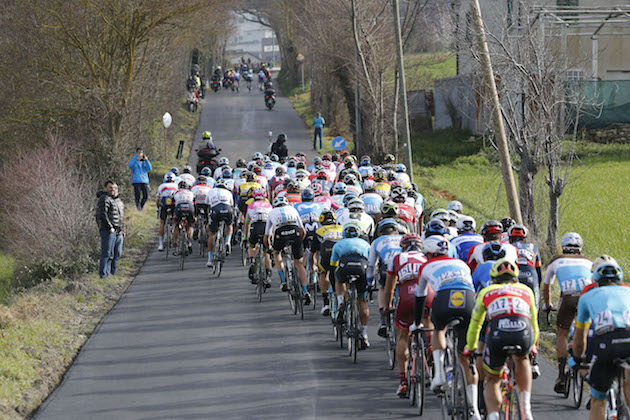Miniature scanners will soon be fitted inside every pro rider's bike to detect motors
UCI introduces a range of new detection methods to catch motor dopers

The peloton on stage five of Tirreno-Adriatico
The latest race content, interviews, features, reviews and expert buying guides, direct to your inbox!
You are now subscribed
Your newsletter sign-up was successful
The UCI has announced a range of new methods in the fight against "technological fraud", including the use of miniature scanners which will be fitted within individual bikes to detect the use of motors.
Speaking at a press conference in Geneva, UCI president David Lappartient unveiled a new bike x-ray trailer which will be deployed for the first time at the Classics this week, as well as future plans to fit scanners within pro's bikes and to use electronic tags to track bikes and wheels which are swapped in races.
While the x-ray machine will be used immediately in conjunction with existing tests and be driven around Europe and beyond to cover 50 per cent of WorldTour race days, the other methods of detection are still in development.
>>> 'Very notable riders' reportedly under investigation for using motors in bikes
The UCI has teamed up with the French Alternative Energies and Atomic Energy Commission (CEA) to develop a magnetometer that will be able to detect the use of motors in bikes and wheels, and also be about the size of a mobile phone to be able to fit inside a standard bicycle frame.
This system, which neither Lappartient nor CEA deputy director Gabriele Fioni were able to give a timeline on its development, will use a magnetometer to detect the stray magnetic field which would be created by the use of a motor in the frame or by electromagnetic wheels.
When this occurs, an alert will be sent to the UCI commissaires, who will then be able to locate the offending bike and rider, and pass the bike through an x-ray machine at the finish or disassemble it to look for a motor.
The latest race content, interviews, features, reviews and expert buying guides, direct to your inbox!
The future will also see the roll out of radio-frequency identification (RFID) tags on bikes and wheels, which will allow commissaires to investigate suspicious bike and equipment changes during races if they suspect that a rider has switched from a motorised bike onto a "clean" bike in order to avoid motor checks.
However in the meantime, the UCI commissaires will rely on the new x-ray machine, which will provide "definitive" tests for motors.
Watch: What's it like to ride a motorised bike?
Speaking about the new testing methods, UCI president David Lappartient said that he hoped that there would be no one caught using a hidden motor, but that if anyone was tempted to use a motor then they could not slip through the net.
"The role of the UCI is the guarantee the credibility of the results and protect athletes," Lappartient said. "We wish to demonstrate that our riders are riding on equal terms. We want to prove that everyone is on a level playing field.
"The fight against technological fraud is about showing that our sport is healthy, to show that athletes obey the rules and guarantee that everything is normal. This means that there have to be checks."
Away from the professional sport, the UCI is also working with national federations to develop a solution that would allow commissaires at amateur races to check amateur riders' bikes for motors. This is also still under development, but will likely be similar to the iPad test currently used by UCI commissaires, albeit using a device produced specifically for this application in order to increase accuracy and reduce costs.
The UCI has used various methods to detect hidden motors in the past, including using x-rays, but the focus in recent years has been on the use of thermal imaging cameras held by race commissaires on the back of motorbikes and a magnetic resistance test which uses an adapted Apple iPad to scan bikes prior to and after races.
However this last method has received considerable criticism, with a joint investigation by French and German television and an Italian newspaper finding evidence that the UCI's iPads were unable to detect electromagnetic motors hidden in wheels.
There has been only one confirmed case of what the UCI calls "technological fraud", but which has also been called "motorised doping" or "mechanical doping", in professional cycling when Belgian rider Femke Van den Driessche was caught with a motor in her spare bike at the Cyclocross World Championships in 2016. Van den Driessche was banned for six years by the UCI, but by that point had already announced her retirement from the sport aged 19.
However there have been more examples of motors being used within amateur cycling, with 43-year-old French amateur rider Cyril Fontayne having recently been banned for five years and told to pay a symbolic €1 fine to the French Cycling Federation, while a 53-year-old Italian amateur was also caught using a motor in a race last summer having refused to allow officials to inspect his bike as he "had a wedding to go to".
The UCI will hope that the combination of highly technical checks at a professional level and the new testing method that will be available to national federations will make these stories at the top and bottom of the sport a thing of the past.
Henry Robertshaw began his time at Cycling Weekly working with the tech team, writing reviews, buying guides and appearing in videos advising on how to dress for the seasons. He later moved over to the news team, where his work focused on the professional peloton as well as legislation and provision for cycling. He's since moved his career in a new direction, with a role at the Department for Environment, Food and Rural Affairs.